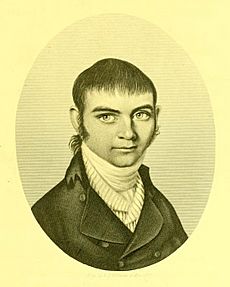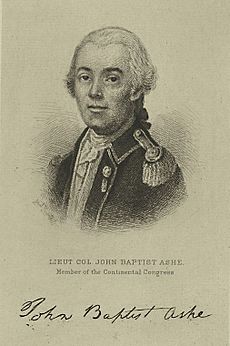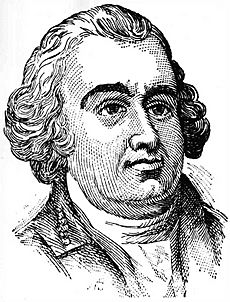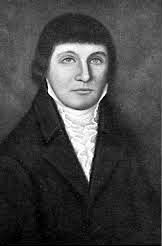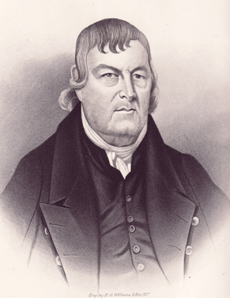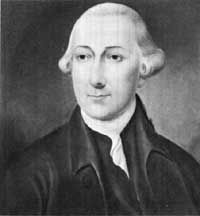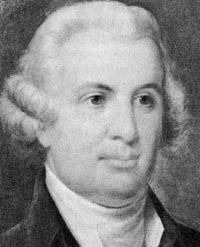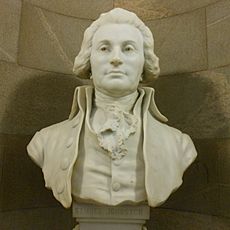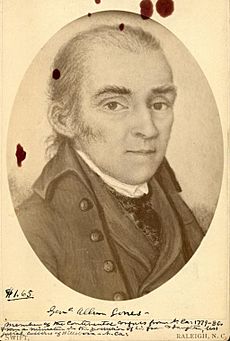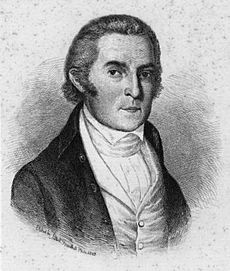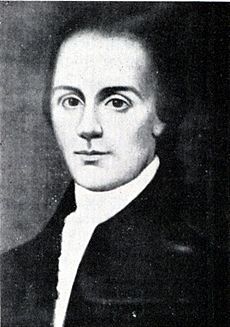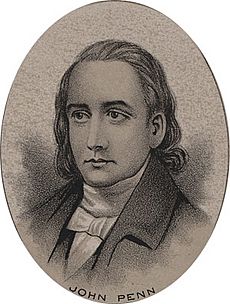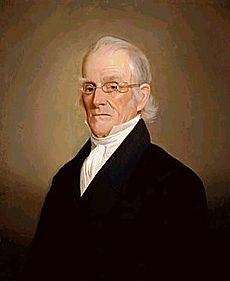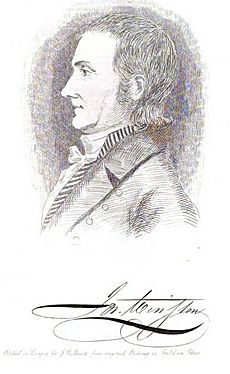Fourth North Carolina Provincial Congress facts for kids
Quick facts for kids Fourth North Carolina Provincial Congress (1776) |
|||||
|---|---|---|---|---|---|
|
|||||
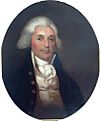
President Samuel Johnston
|
|||||
| Overview | |||||
| Legislative body | North Carolina Provincial Congress | ||||
| Jurisdiction | North Carolina, United States | ||||
| Meeting place | Halifax, North Carolina | ||||
| Term | 1776 | ||||
| Members | 153 Delegates (35 counties, 8 Districts) | ||||
| President | Samuel Johnston | ||||
| Vice-President | Allen Jones | ||||
| Secretary | James Green Jr. | ||||
| Assistant Secretary | James Glasgow | ||||
| Clerk | John Hunt | ||||
| Sessions | |||||
|
|||||
The Fourth North Carolina Provincial Congress was a special group of leaders who met in North Carolina during the American Revolution. They were like a temporary government, working outside the rules set by the British. This Congress was one of five similar groups that met between 1774 and 1776.
These congresses helped create a new government for North Carolina. They also printed money to pay for the fight against Britain. They even organized an army to protect the state. Later, they wrote North Carolina's first constitution and Bill of Rights. The Fourth Congress met in Halifax, North Carolina, from April 4 to May 14, 1776. Samuel Johnston was the president, and Allen Jones was the vice-president. These meetings helped set the stage for North Carolina's official state government.
Contents
Important Decisions of the Congress
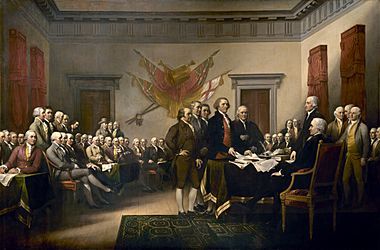
The Fourth North Carolina Provincial Congress made some very important decisions. They gave permission for North Carolina's representatives to the Second Continental Congress to vote for the Declaration of Independence. These representatives included Joseph Hewes, William Hooper, and John Penn.
The Halifax Resolves
On April 12, 1776, 83 delegates at the Congress officially adopted the Halifax Resolves. This was a big step! It was the first time any colony officially called for independence from Great Britain. It showed that North Carolina was ready to break away and form its own government.
Creating a State Constitution
The very next day, on April 13, 1776, the delegates started working on a new constitution for North Carolina. A constitution is a set of rules for how a government will work. This new constitution was finally approved in December 1776 by the Fifth North Carolina Provincial Congress.
Rules for Loyalists
The Congress also made rules about people called Loyalists. These were colonists who wanted to stay loyal to the British King. In April 1776, the Congress decided that Loyalists who were causing trouble should move away. They were allowed to sell their property first. Later, in May 1776, the Congress voted to take away the property of any Loyalists who fought against the new United States.
Members of the Congress
Many important people from different parts of North Carolina served in the Fourth Provincial Congress. They represented various counties and districts. Here is a list of the delegates and the areas they represented:
| County or Town/District | Delegate |
|---|---|
| Anson | John Child |
| Anson | John Crawford |
| Anson | Daniel Love |
| Anson | James Pickett |
| Anson | Samuel Spencer |
| Beaufort | John Cowper |
| Beaufort | Roger Ormond |
| Beaufort | Thomas Respess, Jr. |
| Bertie | John Campbell |
| Bertie | John Johnston |
| Bertie | Charles Jaycocks |
| Bladen | Thomas Amis |
| Bladen | Maturin Colville |
| Bladen | James Council |
| Bladen | Nathaniel Richardson |
| Bladen | Thomas Robeson, Jr. |
| Brunswick | Unknown/Vacant |
| Bute | William Alston |
| Bute | Philemon Hawkins |
| Bute | Green Hill |
| Bute | William Person |
| Bute | Thomas Sherrod |
| Carteret | John Backhouse |
| Carteret | Solomon Shepard |
| Carteret | William Thompson |
| Chatham | Elisha Cain |
| Chatham | Jeduthan Harper |
| Chatham | Ambrose Ramsey |
| Chatham | Joseph Rosser |
| Chatham | John Thompson |
| Chowan | Thomas Benbury |
| Chowan | John B. Beasly |
| Chowan | Thomas Hunter |
| Chowan | Samuel Johnston |
| Chowan | Thomas Jones |
| Craven | Jacob Blount |
| Craven | John Bryan |
| Craven | William Bryan |
| Craven | James Coor |
| Craven | Lemuel Hatch |
| Cumberland | Farquard/Farquhard Campbell |
| Cumberland | Alexander McAllister |
| Cumberland | Alexander McCoy (McKay) |
| Cumberland | Thomas Rutherford |
| Cumberland | David Smith |
| Currituck | Samuel Jarvis |
| Currituck | Gideon Lamb |
| Currituck | Solomon Perkins |
| Currituck | James Ryan |
| Currituck | James White |
| Dobbs | Simon Bright |
| Dobbs | Richard Caswell |
| Dobbs | William McKinnie |
| Dobbs | George Miller |
| Dobbs | Abraham Sheppard |
| Duplin | Richard Clinton |
| Duplin | William Dickson |
| Duplin | Thomas Gray |
| Edgecombe | Elisha Battle |
| Edgecombe | Nathan Boddie |
| Edgecombe | William Haywood |
| Edgecombe | Henry Irwin |
| Edgecombe | Duncan Lemon |
| Granville | Charles A. Eaton |
| Granville | Memucan Hunt |
| Granville | John Penn |
| Granville | Thomas Person |
| Granville | John Taylor |
| Guilford | William Dent |
| Guilford | Ralph Gorrell, Jr. |
| Guilford | Ransom Sutherland |
| Halifax | Willis Alston |
| Halifax | John Bradford |
| Halifax | James Hogun |
| Halifax | David Sumner |
| Halifax | Joseph John Williams |
| Hertford | Laurence/Lawrence Baker |
| Hertford | Matthias Brickell, Jr. |
| Hertford | William Murfree |
| Hertford | Robert Sumner |
| Hyde | Joseph Hancock |
| Hyde | John Jordan |
| Hyde | Rotheas Latham |
| Hyde | Benjamin Parmelin |
| Johnston | Needham Bryan, Jr. |
| Johnston | Henry Rains |
| Johnston | Samuel Smith, Jr. |
| Martin | Whitmell Hill |
| Martin | Kenneth McKenzie |
| Martin | Edward Smithwick |
| Martin | Thomas Wiggins |
| Martin | William Williams |
| Mecklenburg | John McKnitt Alexander |
| Mecklenburg | Robert Irwin |
| Mecklenburg | John Phifer |
| New Hanover | John Ashe |
| New Hanover | Samuel Ashe |
| New Hanover | John DeVane |
| New Hanover | John Hollingsworth |
| New Hanover | Sampson Mosely |
| Northampton | Jeptha Atherton |
| Northampton | Howard/Howell Edmunds |
| Northampton | Drewry Gee |
| Northampton | Eaton Haynes |
| Northampton | Allen Jones |
| Northampton | Samuel Lockhart |
| Northampton | Eaton Haynes |
| Onslow | Benjamin Doty |
| Onslow | John King |
| Onslow | George Mitchell |
| Onslow | John Norman |
| Onslow | John Spicer |
| Orange | Thomas Burke |
| Orange | John Butler |
| Orange | John Kinchen |
| Orange | Nathaniel Rochester |
| Orange | James Saunders |
| Pasquotank | Henry Abbot |
| Pasquotank | Thomas Boyd |
| Pasquotank | Dempsey Burgess |
| Pasquotank | William Cumming |
| Pasquotank | Joseph Jones |
| Perquimans | Charles Blount |
| Perquimans | Miles Harvey |
| Perquimans | Thomas Harvey |
| Perquimans | Charles Moore |
| Perquimans | William Skinner |
| Pitt | William Robeson |
| Pitt | Edward Salter |
| Pitt | John Simpson |
| Rowan | John Johnston |
| Rowan | Matthew Locke |
| Rowan | Griffith Rutherford |
| Surry | Charles Gordon |
| Surry | Joseph Williams |
| Surry | Joseph Winston |
| Tryon | James Johnston |
| Tryon | Charles McLean |
| Tyrrell | Archibald Corry |
| Wake | John Hinton |
| Wake | William Hooper |
| Wake | Tignal Jones |
| Wake | Joel Lane |
| Wake | John Rand |
| Bath District | William Brown |
| Campbellton Town | Arthur Council |
| Edenton District | Joseph Hewes |
| Halifax District | Willie Jones |
| Halifax District | John Webb |
| Hillsborough District | William Johnston |
| New Bern District | Abner Nash |
| Salisbury District | David Nesbitt |
| Wilmington District | Cornelius Harnett |
 | Aurelia Browder |
 | Nannie Helen Burroughs |
 | Michelle Alexander |


